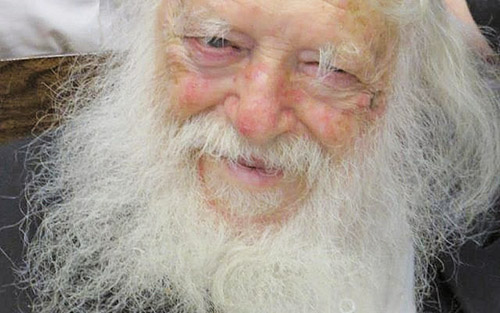
Tens of thousands of words have been spoken and written in recent days throughout the media describing the legendary Rabbi Chaim Kanievsky, zt”l.
There is no doubt that this was a man of magnitude, the likes of whom we do not encounter every day. Rabbi Kanievsky demanded that the world be measured by the timeless nature of the Torah and its relevance in every generation. I seek to bring to light an anomaly that characterized him but was less talked about.
He was a radical when it came to his spiritual world; his perseverance was absolute and his scope of knowledge was absolute. His concern for his wife and the respect he had for her was absolute as well as his prayer, which was also absolute. However, in matters that concerned the public, he showed great moderation, until the Peleg Hayerushalmi (Jerusalem faction) perceived Rabbi Kanievsky as too moderate and chose to follow the leadership of Rabbi Shmuel Orbach. In the book, “The Haredim” (p. 224), we see that already in 1984, on the day of the elections, he wrote a note, “My family and I are going to vote for Shas.” Copies of the letter were delivered by Shas activists to all yeshivas around the country to show that the legendary “Steipler” family is voting for Shas and not for Agudat Israel.
He demanded Torah study in Talmud Torahs, but was the first to call for vaccinations. He never sided with the political extremes in Israel and did not show great sympathy for “Greater Israel.” He did join the political right because of the traditional aspect, but above all I found moderation in his commentary of the Book of Esther (Divrei Siach, Adar 5775).
In Chapter 1, verse 8, it is written, “to serve each man what he wished,” and in Tractate Megillah, daf 12, part 1, the Gemara says that Mordechai and Haman, as interpreted by Rashi, were the sarei hamashkim (royal butlers) at the feast. The question that is asked is how did Mordechai agree to be the sar hamashkim and fail Israel with the prohibitions of yayin nesech (wine that was poured in the service of idolatry) and the bishul akum (a rabbinic restriction that forbids a Jew from eating foods cooked by a non-Jew). After all, Mordecai himself warned them not to go to the feast. The explanation is as follows: Mordechai wanted to be the sar hamashkim to keep the wine kosher and also to throw a toothpick into the oven and save the guests from bishul akum, and it ends with the words “we will save as many as we can.”
His interpretation of this passage reveals an approach to reduce a problem, even if the solution is not absolute and perfect.
Many stories and narratives about him will be told, but one fact that cannot be disputed is that he never showed anger; he walked this earth in modesty and humility, with sensitivity and love.
Rabbi Menachem Bombach is a community leader and educational entrepreneur in the haredi community. He heads the “Netzach” haredi educational network, which he founded, and which combines religious and secular studies and aims to educate students to become observant, Torah-loving Jews who are also prepared for practical life. He also heads the hasidic girls’ seminary affiliated with the network.













